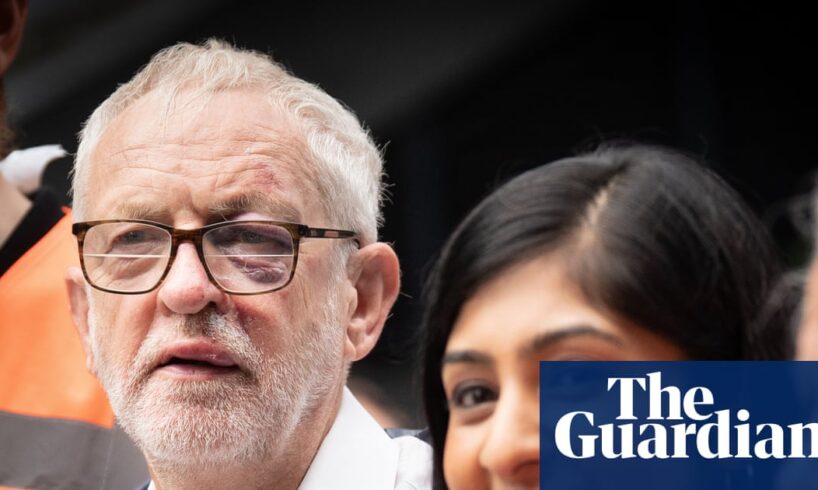
New political parties have a patchy record in British politics. Take Change UK, which launched amid much fanfare in the spring of 2019 and had disbanded by the end of the same year. So can Jeremy Corbyn and Zarah Sultana fare any better? In part it depends on the question you ask.
The new and as-yet unnamed leftwing party formally announced by Corbyn and his fellow ex-Labour MP on Thursday, has one major advantage at its disposal: the former Labour leader’s very strong public profile.
According to a rolling YouGov poll of politicians’ name recognition, Corbyn is known by 98% of voters, more than Keir Starmer or Nigel Farage.
“Everyone knows who Jeremy Corbyn is, everyone knows who he stands for. And with any new party, that is not even half the battle. It’s three-quarters of the battle,” said Robert Ford, a professor of political science at Manchester University.
“A lot of people don’t like what he stands for, but that doesn’t matter, because he’s not aiming for everyone.”
That is the second likely advantage for the organisation, launched under the interim title of “Your Party”. Unlike Change UK, a collection of centrist MPs who defected from Labour and the Conservatives, or indeed unlike Corbyn’s task when he led Labour, there is no need to temper opinions to court the middle ground.
Co-led by Corbyn and Sultana, the party is explicitly aiming itself at left-leaning voters who until now are likely to have backed Labour, the Greens or the collection of Gaza-focused independents who saw off Labour candidates in four constituencies in last year’s election.
“With the best will in the world, not even Zarah Sultana, I suspect, is expecting Jeremy Corbyn to be the next prime minister,” Ford said. “That’s not the purpose of it. The purpose of it is to offer an outlet for those who think Labour have driven too far to the right. So he doesn’t have the same problem that he and his advisers had a few years ago.”
Polling before the party launched suggested it could gather as much as 10% of the vote nationally. However, new parties traditionally struggle to maintain momentum, and turning polls into votes relies on building an effective campaign machine, which is tricky to do from scratch.
All this could make for a complex picture at a constituency level, with Ford noting that it could variously make electoral life harder or easier for Labour MPs, depending on the location and context.
For example, even a 5% haul for a Corbyn-Sultana candidate could mean the difference between Labour win or a loss to the Conservatives or Reform UK.
The new venture could also scupper the Greens in their hopes of taking seats from Labour in the 40 areas where they finished second in 2024, given its likely appeal to some Green voters.
The Greens have dismissed the opening statement from the new party for making “only a passing glance to the climate crisis”, saying this left them stuck in the past, and it is possible that Corbyn’s main electoral hunting ground will be voters sympathetic to the Gaza-focused independents.
The only Labour response has been a brief and scathing party source quote about the electorate having “twice given its verdict on a Jeremy Corbyn-led party”, in the 2017 and 2019 elections.
But the new party is different in its aims, and, politically, 2025 is not 2019. An ostensibly new party, Reform UK, is leading the polls, even if it is Nigel Farage’s third incarnation of Ukip, which can trace its history back more than 30 years. And voter loyalties, which were once relatively fixed, are more fluid than ever.
One thing, however, is constant: the identity of the co-protagonist. Corbyn has a name, but also political baggage, and a reputation for occasional prickliness and falling out with people. The launch of the new party has been slightly stumbling, with allies of Corbyn making plain their annoyance when Sultana announced herself as co-leader of a new group in June. It is also unusual to launch a new party without having agreed on a name.
Can Corbyn and Sultana confound the historical odds? To an extent it doesn’t entirely matter. In the currently fragmented multiparty world, even moderate success could have a disproportionate impact.




